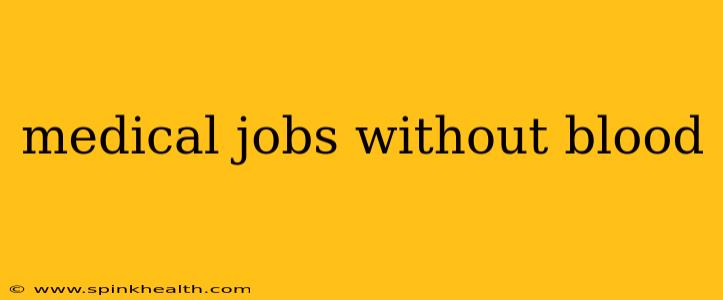Medical Jobs Without Blood: A Career Path for the Faint of Heart (But Not of Spirit!)
Let's be honest, the sight of blood isn't for everyone. But that doesn't mean a career in medicine is off the table. In fact, the medical field is vast and varied, offering a plethora of rewarding careers that don't involve direct exposure to blood. If you're passionate about helping people but the thought of needles and surgeries makes you queasy, this is the guide for you. We'll explore some fulfilling options and address some common questions.
What medical jobs are there that don't involve blood?
This is a question many aspiring medical professionals ask, and the answer is surprisingly broad. You might picture a surgeon when thinking of a medical career, but there are countless other roles vital to healthcare that are bloodless. Think of it like a well-oiled machine—a hospital or clinic needs many different parts working together smoothly, and you could be a crucial component.
What are some examples of medical careers that avoid direct contact with blood?
Let's dive into some specific examples. These roles offer diverse experiences and skillsets, catering to various interests and aptitudes:
1. Medical Administration: The backbone of any healthcare facility, medical administration involves managing operations, finances, and staff. Roles like healthcare administrators, medical office managers, and health information technicians are all vital and largely bloodless. You’ll be orchestrating the smooth running of the entire operation, ensuring efficiency and patient care without the gore.
2. Pharmacy: Pharmacists are essential in dispensing medication and advising patients on drug interactions and usage. They play a crucial role in patient care, ensuring correct medication is prescribed and used safely. The focus here is on chemical compounds and precise dispensing, not direct patient contact involving blood.
3. Medical Research: From analyzing data to conducting clinical trials, many research roles don't require direct patient contact. Biostatisticians, epidemiologists, and research assistants all contribute significantly to medical advancements without encountering blood.
4. Medical Imaging: Radiology technicians, sonographers, and MRI technologists utilize advanced imaging techniques to diagnose medical conditions. While they work closely with patients, the actual procedure involves minimal to no blood contact. They’re the detectives of the medical world, using technology to reveal hidden clues.
5. Physical Therapy and Occupational Therapy: These professions focus on rehabilitation and improving patients' physical function. While injuries may be involved, the treatment itself usually doesn’t involve direct blood contact. The focus is on restoring movement and functionality.
6. Public Health: Public health professionals work to improve community health through education, disease prevention, and policy development. It’s a less direct patient-focused role, but incredibly impactful in improving overall health outcomes.
7. Medical Billing and Coding: These professionals handle the financial side of healthcare, ensuring accurate and timely billing processes. This role is crucial in keeping the healthcare system functioning, and it's completely bloodless.
8. Medical Writing and Editing: If you have a knack for words and a passion for medicine, medical writing and editing might be your calling. You could work creating educational materials, medical journals, or pharmaceutical documents.
Are there any medical jobs involving less direct patient contact?
Yes, many medical jobs have minimal direct contact with patients. For instance, roles in medical technology development, pharmaceutical sales, or healthcare law offer opportunities within the medical field with less direct patient interaction. This allows individuals to contribute to the medical industry while maintaining a comfortable distance from procedures involving blood.
What educational requirements do these medical jobs without blood entail?
Educational requirements vary greatly depending on the specific job. Some roles, like medical administration, might require a bachelor's degree, while others, like pharmacy, necessitate a Doctor of Pharmacy (PharmD) degree. It's essential to research the specific educational path for your desired career.
Ultimately, a successful career in medicine doesn't necessitate a tolerance for blood. Numerous rewarding and essential roles exist for those who wish to contribute to healthcare without direct exposure. With careful planning and the right educational path, you can build a fulfilling career in the medical field that aligns with your interests and sensitivities. So, if you’re passionate about healthcare but apprehensive about blood, don't let that hold you back. The world of medicine welcomes you—bloodless or not!

